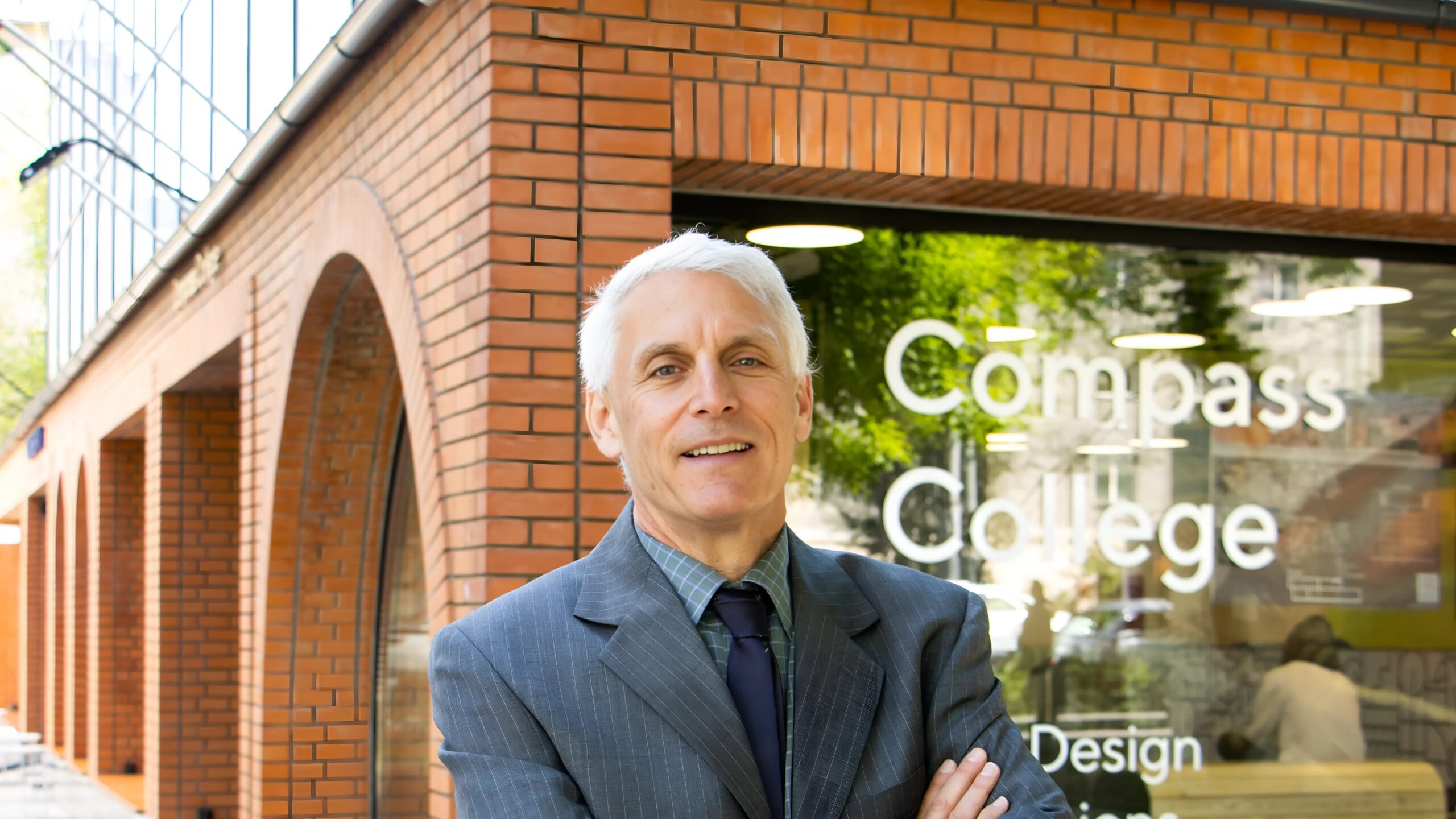A Journey Fueled by Passion for International Education
Andrew Wachtel, Co-founder and Director of Compass College of Art and Design Professions and President of inVision U, has dedicated his career to international education. His journey began with a PhD in Slavic languages and literatures, leading him to become a researcher and creator of large-scale projects involving multiple countries. While never abandoning his academic career, Wachtel began to take on large administrative roles, becoming Dean of The Graduate School at Northwestern University in 2004 and President of the American University of Central Asia in 2010. “Having lived in Central Asia for the past 15 years, I continue to find opportunities to expand the horizons of students and faculty in ways that would not be possible in more developed educational systems,” he shares. His motivation is rooted in the desire to help students and faculty achieve their full potential.
Wachtel’s passion for international education is evident in his extensive experience and the innovative projects he has spearheaded. He sees education as a powerful tool for empowering individuals and fostering global understanding. “As I moved into academic administration, I recognized that I could do more to help students and faculty in the areas I worked as an institution builder than as a pure scholar,” he explains. This realization led him to co-found Compass College, the first contemporary school of design in Central Asia, and to serve as the president of inVision U, an institution created by Arsen Tomsky, the CEO and founder of the company inDrive, dedicated to producing leaders and founders in underserved regions.
Addressing Pressing Challenges in International Education
One of the primary challenges Wachtel identifies in international education is providing students with both immediate skills and long-term competencies. “The biggest challenge is to give students skills, competencies, and knowledge they can use in the short term while simultaneously providing a strong fundamental background,” he explains. As artificial intelligence (AI) advances, the ability to ask complex and unusual questions becomes crucial, necessitating fundamental reforms in educational approaches. Wachtel’s projects balance hard and soft skills and theoretical and practical education, constantly putting students in situations where they must apply what they’ve learned and identify gaps in their knowledge independently.
Wachtel emphasizes the importance of teaching students to work together productively, taking advantage of multiple perspectives to identify key, solvable problems and propose approaches to overcoming them. “As AI gets better at answering questions, the ability to recognize and pose complex, difficult, and unusual questions will become more important,” he notes. The educational projects he leads implement strategies that foster collaboration and critical thinking, ensuring that students are equipped to navigate an ever-changing world.
Embracing Educational Experiments in Central Asia
Kazakhstan and Kyrgyzstan are emerging as significant players in global education, offering unique opportunities for students and educators. Wachtel notes, “Having lived for many years in the shadow of Soviet/Russian approaches to education, the countries of Central Asia are now willing to embrace real educational experiments.” This openness provides a fertile ground for innovative educational practices that would not be possible in more established educational systems in the US or Europe. Wachtel leverages these opportunities to create impactful educational experiences.
Pivotal Moments and Lasting Impacts
Reflecting on his leadership roles, Wachtel emphasizes the importance of questioning institutional practices and delegating responsibility. “Two things have been important for success everywhere I’ve worked: the ability to ask, ‘why are we doing this?’ and a willingness to allow team members the autonomy to do their jobs within a provided frame,” he shares. Encouraging team members to take responsibility leads to greater satisfaction and productivity, particularly in regions with strong hierarchical systems like the former USSR.
Wachtel highlights the significance of empowering team members to make decisions and take ownership of their work. “Delegation of responsibility is difficult because for sure some of your team members will make mistakes. But unless you allow this, they’ll never take responsibility, and you’ll have to do everything yourself,” he notes. By fostering a culture of trust and accountability, Wachtel has been able to drive institutional success and create lasting impacts.
Ensuring Accessibility and Relevance in International Education
It is crucial to make high education accessible and relevant amid technological advancements and geopolitical shifts. At Compass College, the focus is on providing excellent value for tuition, preparing students for both local and global job markets. The goal is to provide students with the best possible value for their investment, equipping them in a short time frame with the skills and knowledge needed to succeed in a dynamic global landscape. “We need to ensure that students can exploit the latest technologies while not being swallowed by them,” Wachtel emphasizes.
The support from sponsors like Arsen Tomsky, founder of the company inDrive, allows inVision U to offer free education while maintaining high standards. “His generosity allows us to have extremely high expectations of our students. Choosing the right ones, young men and women who really want to make a difference in their home countries and regions, will be a challenge,” Wachtel acknowledges.
Fostering Cross-Cultural Collaboration and Partnerships
Strategies for fostering cross-cultural collaboration and global academic partnerships involve demonstrating the competitiveness of students and faculty. “One advantage of being in a relatively unknown part of the world is that if we can show that our students are globally competitive, lots of partners are interested in working with us,” he explains. Genuine collaboration and mutual respect are key to successful partnerships, avoiding exploitation and enhancing outcomes for all involved.
Wachtel believes in the importance of creating partnerships that are based on mutual benefit and respect. “Unfortunately, many players in the US and UK are more interested in making money or in attracting a few geniuses from Central Asia to improve their own competitive position than in working with partners to improve everyone’s outcomes,” he notes. By focusing on genuine collaboration, he has been able to establish meaningful partnerships that contribute to the growth and success of all parties involved.
Distinguishing Successful International Universities
For Wachtel, the distinction of a successful international university lies in creating competitive graduates and faculty who are the intellectual equals of their global peers. “You need to have the confidence to believe that your best graduates are as good as anyone, and they need to back that up through their work,” he asserts. Building respect and trust with potential partners requires producing high-quality outcomes and maintaining intellectual standards.
In today’s interconnected world, there is no such thing as a university that is not international. “But if your institution is in an obscure part of the world, you need to work hard to earn the respect and trust of potential partners,” he advises. By maintaining high academic standards and producing graduates who can compete on a global stage, Wachtel ensures that his institutions are recognized and respected internationally.
Enhancing Student Mobility and Global Engagement
Recognizing the importance of student mobility and global engagement, Wachtel nevertheless insists on the importance of persuading top students and faculty to stay in Central Asia. “We need the best students and faculty to appreciate that their opportunities if they stay will be at least as good (if not better) than if they leave,” he says. By highlighting local opportunities and fostering global connections, Wachtel aims to retain talent and build a strong academic community in the region.
To achieve this it is crucial to showcase the potential for growth and success within Central Asia. “It’s our job to convince some of them to build something here.”By creating a supportive and dynamic academic environment, Wachtel aims to retain top talent and encourage them to contribute to the development of their home countries.
Balancing Local Culture with International Standards
At Compass College, integrating local culture and values with international standards involves encouraging students to draw from local traditions while creating original, high-quality designs. “We teach them to look for materials or motifs drawn from local traditions but that can be repurposed for local and international audiences.” At inVision U, a unique curriculum and faculty from Central Asia with Western training ensure that students have relevant role models and receive a world-class education.
Wachtel believes in the importance of preserving local culture while achieving global excellence. “This requires avoiding ‘fakelore’ and the blind use of ethnic motifs, encouraging students to create original designs of the highest international standard that still gesture toward local traditions,” he emphasizes. By striking this balance, students are grounded in their cultural heritage while being prepared to excel on a global stage.
Guiding Students to Prestigious Global Institutions
Wachtel emphasizes the importance of guiding students to pursue meaningful opportunities at prestigious global institutions. “It’s our job to ensure that they pursue the opportunities they need, rather than blindly going abroad to seemingly prestigious schools that in most cases don’t really care about them.” By encouraging students to articulate their goals and critically evaluate their choices, Compass College and inVision U help them make informed decisions that align with their aspirations.
Advising plays a crucial role in this process, as students often receive unreliable information from the internet. “We encourage our students to articulate why they want to go where they want to go and ask whether the institution they propose to attend will help them to reach their goals.” This approach ensures that students are making choices that align with their personal and professional objectives.
Nurturing Leadership Skills Among Students and Faculty (continued)
Leadership development is a cornerstone of the inVision U project. But it cannot be taught through academic courses alone. “We want to put students and faculty in positions where they need to lead and work with them to reflect on their successes and failures as they try to create something new,” he explains. Active practice and reflection on leadership experiences are essential for nurturing effective leaders.
At inVision U, students and faculty are encouraged to take on leadership roles within the institution and their communities. This hands-on approach allows them to develop practical leadership skills and gain valuable experience in navigating challenges and driving initiatives forward. “It doesn’t help to know about leadership passively; you should actively practice it and see the results,” Wachtel emphasizes. By creating an environment that fosters leadership development, inVision U prepares its students and faculty to become influential leaders who can make a meaningful impact in their fields.
Trends Shaping the Future of International Education
Looking ahead, Wachtel identifies AI’s transformative impact as a key trend shaping the future of international education. He predicts a shift towards shorter-term, professionally focused degrees and a decline in the traditional BA program. “More students will need shorter-term professionally focused degrees like the ones we give at Compass College, while a much smaller number will require the intensive, complicated, and deep education we will provide at inVision U,” he shares. This shift will lead to a crisis for traditional universities that have relied on the BA degree as their primary offering.
Wachtel foresees a future where the demand for undergraduate education will decrease, and the need for specialized, professionally focused programs will rise. “The need for a workforce of people with less than stellar undergraduate education will be smaller,” he predicts. Institutions must adapt to these changes by offering programs that cater to the evolving needs of students and the job market. Wachtel’s forward-thinking approach ensures that Compass College and inVision U are well-positioned to meet these challenges and provide relevant, high-quality education.
The Role of Digital Transformation
Wachtel believes that while digital transformation affects the context of education, it does not change the core principles of teaching and learning. “The role of digital transformation is massively overrated in education,” he asserts. Education is about teaching young people to think, analyze, ask questions, and lead fulfilled lives. Digital tools are essential, but the heart of education lies in human interactions and mentorship.
At Compass College and inVision U, digital tools are integrated into the curriculum to enhance learning experiences, but they are not the focal point. “Our students need to use digital tools fluently, understand their strengths and weaknesses, and find a role for themselves in this digitalized world.” By striking a balance between digital tools and human interactions, these institutions ensure that students receive a well-rounded education that prepares them for the challenges of the digital age.
Advice to Educators and Policymakers
Drawing from his extensive experience, Wachtel offers advice to educators and policymakers. He urges colleagues in privileged regions to genuinely engage with and understand the needs of less privileged areas rather than exploiting them. “Try talking to people living and working there to understand what they actually need,” he advises. For those outside the privileged bubble, he emphasizes producing world-class students without encouraging emigration. “It’s tough, but it can be done,” he concludes.
Wachtel’s advice highlights the importance of collaboration and mutual respect in the field of international education. By fostering genuine partnerships and addressing the unique needs of different regions, educators and policymakers can create impactful and sustainable educational programs. Wachtel’s vision for international education is one that prioritizes equity, inclusivity, and excellence, ensuring that all students have the opportunity to succeed.
Andrew Wachtel’s unwavering commitment to transforming international education, addressing pressing challenges, and fostering cross-cultural collaboration makes him a visionary leader shaping the future of international education in Central Asia. His dedication to empowering students and faculty, promoting innovative approaches, and maintaining high academic standards continues to drive positive change and inspire future generations.
His pioneering work at Compass College and inVision U demonstrates his ability to adapt to the evolving landscape of education and create institutions that prioritize student success and holistic development. By embracing educational experiments, leveraging unique opportunities in Central Asia, and fostering a culture of critical thinking and collaboration, Wachtel has set a new standard for international education. Andrew Wachtel’s legacy as a visionary leader in international education is one of transformation, empowerment, and excellence. His contributions to the field will continue to shape the future of education in Central Asia and beyond, inspiring educators, students, and policymakers to strive for a more inclusive and equitable global education system.




